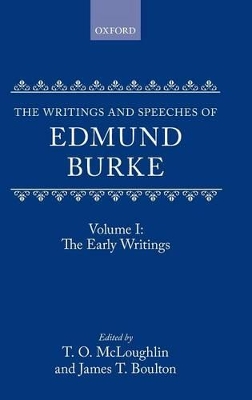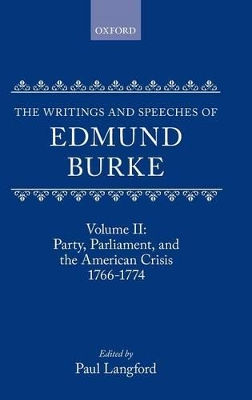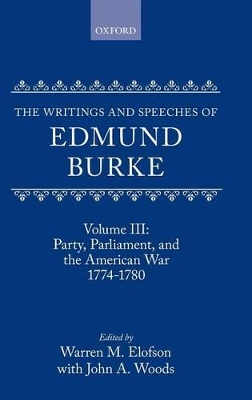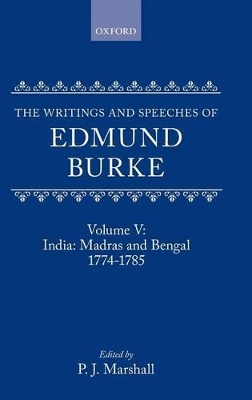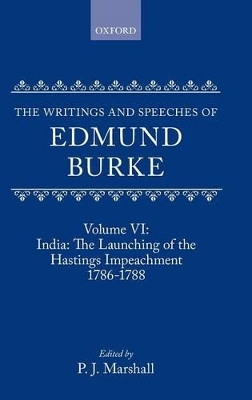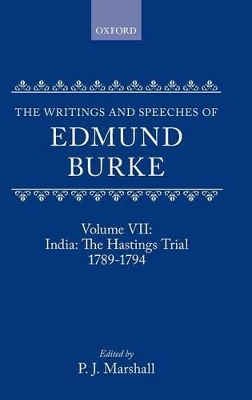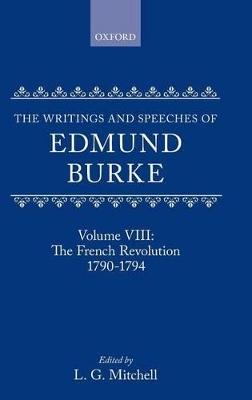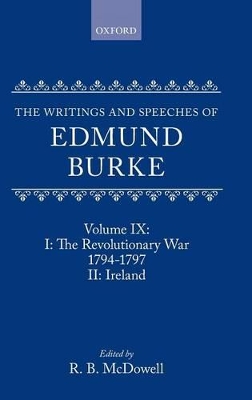The Writings and Speeches of Edmund Burke
8 primary works • 9 total works
I
intellectual life of his times.
The one work of Burke's early life which has long been recognized as having prime critical significance, the Sublime and the Beautiful, is naturally found here. In addition the volume includes the first fully edited version of other works which have been neglected, notably the Vindication of Natural Society, a substantial satire on current philosophical and religious thought, the Abridgement of English History and the Hints for an Essay on the Drama. The
volume also prints reliable texts of his early poems and prose `characters' as well as the first complete text of The Reformer since it was first published in 1748. This was a weekly paper devoted principally to the Dublin cultural scene and was edited by Burke shortly after he graduated from Trinity College, Dublin.
II
Volume II: Party, Parliament and the American Crisis, 1766-1774
by Edmund Burke
A scholarly edition of the writings and speeches of Edmund Burke. The edition presents an authoritative text, together with an introduction, commentary notes, and scholarly apparatus.
III
Volume III: Party, Parliament, and the American War 1774-1780
by Edmund Burke
March 1775, published, and circulated to a wide audience on both sides of the Atlantic. In that speech, Burke used the full force of his intellect and eloquence to set out the Rockinghams' first comprehensive plan for achieving lasting peace in the Empire. The public commendation he received helped him to
gain recognition for offerings such as his second conciliation proposal in November 1775, and his Letter to the Sheriffs of Bristol in 1777. It also gave him some of the confidence he needed to announce the Whig party's historic conversion to a moderate reform programme in his celebrated speeches on economical reform in 1779 and 1780.
Numerous writings and speeches in this volume are transcriptions of previously unpublished manuscripts from the collections at Sheffield and Northampton. These allow the reader new insights into the workings of Burke's mind not just in relation to the major political issues, but also to a multitude of engaging subjects such as education, capital punishment, religious dissent, and the return of the Rockingham Whigs to government power,
V
The Writings and Speeches of Edmund Burke: Volume V: India: Madras and Bengal 1774-1785
by Edmund Burke
A scholarly edition of the writings and speeches of Edmund Burke. The edition presents an authoritative text, together with an introduction, commentary notes, and scholarly apparatus.
VI
Volume VI: India: The Launching of the Hastings Impeachment 1786-1788
by Edmund Burke
The material presented in this volume covers two years of proceedings in the House of Commons and the first session of the trial in the Lords. Its highlights are two great set-piece speeches delivered to the Commons, which can be reconstructed from manuscript material as well as from contemporary reports; and the four-day oration with which Burke opened the prosecution before the Lords: for this a complete verbatim shorthand record exists. The material in these and other speeches is not only
central to an understanding of Burke and India, but to his moral and political thought as a whole in the years immediately before the outbreak of the French Revolution.
VII
The texts for the items, which have appeared in previous editions of Burke's Works, have been reconstructed, largely by the use of manuscripts. Indeed many of the shorter speeches appear here in print for the first time.
The volume includes a key speech which introduced one of the main charges in the trial of Warren Hastings on an impeachment from 1789-1794, and an important report on the conduct of the trial. It closes with the enormously lengthy and significant speech in which Burke summed up the prosecution's case over nine days.
However, this volume is not only a full exposition of Burke's views on India but contains much of great interest about other aspects of his thought. In particular, Burke saw himself in these years as being engaged in a battle against the lawless disruption of society, both in Europe and in Asia, in order to maintain the rule of a universal justice, a main theme of this volume.
VIII
of the French Revolution, this edition shows that the issues raised by the most influential commentaries on that Revolution have yet to be resolved.
IX
Volume IX: Part I. The Revolutionary War, 1794-1797; Part II. Ireland
by Edmund Burke
social life, and issued a clarion call for a European crusade to save civilization.
Part II contains Burke's writings and speeches relating to Ireland. From his entry into political life, he was intensely interested in Irish problems, religious, economic, and constitutional, and in Anglo-Irish relations. Fervently believing that Great Britain and Ireland should be partners within the Empire, in his last years he was deeply disturbed by the influence of the French Revolution on Irish politics.
This volume addresses Burke's views on the authority of Parliament over the British provinces in India, and his concerns about the implications of the French Revolution for British politics. He also expresses his views on issues that had always greatly interested him, such as the reform of criminal law, the confinement of debtors, and the abolition of what he regarded as outmoded economic regulations.
The texts for the items, which have appeared in previous editions of Burke's Works, have been reconstructed, largely by the use of manuscripts, and many of the shorter speeches appear here in print for the first time.
